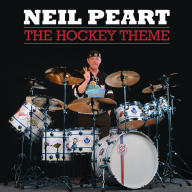Born in Canada on September 12, 1952, Peart began learning the drums at the age of 13 and by the late '60s/early '70s, he'd immersed himself in the challenging sounds of such rock drummers as the Who's Keith Moon, ELP's Carl Palmer, Yes' Bill Bruford, and legendary big-band drummer Buddy Rich. After a brief stint living in England (where he discovered the writings of Ayn Rand), Peart returned to Canada in the early '70s and found out that the up-and-coming band Rush, who had just wrapped up touring behind their debut album, was looking for a new drummer. Peart was granted a tryout and immediately asked to join, as the trio (which also included singer/bassist Geddy Lee and guitarist Alex Lifeson) sought to expand on their musical direction, which then consisted of extended blues jams in the manner of Led Zeppelin and Cream.
Peart's entrance into the band signaled that Rush would focus on more challenging material, and the drummer also took over the reins as the group's lyricist. While it would take a few releases for Rush's new musical direction to gel (1974's Fly by Night and 1975's Caress of Steel), the band hit paydirt with the 1976 concept album 2112. The record told the story of a young man's fight against a future world where rock music is outlawed, with Peart applying Ayn Rand's writing style and philosophies to the plot's story line. Rush's commercial success continued as the band scored more heavy metal-tinged prog rock classics like 1977's A Farewell to Kings, 1978's Hemispheres, 1980's Permanent Waves, and Rush's finest hour, 1981's Moving Pictures. The group continued to rack up hit albums and sold-out arena tours (with all three members consistently winning magazine polls for being the best at their respective instrument), and Peart's influence on rock drummers had become immense, as evidenced by the styles of Dream Theater's Mike Portnoy, King's X's Jerry Gaskill, and Primus' Tim Herb Alexander.
In addition to his Rush duties, Peart found time to become a writer himself, penning the books Radiance Over the Rockies and The Masked Rider, traveling the world and sight-seeing between tours (Peart was an avid bicyclist), as well as organizing a Buddy Rich tribute concert in the early '90s. The future of Rush was thrust into doubt by the late '90s, however, when Peart was dealt two devastating blows in his personal life: the tragic deaths of both his teenaged daughter and his wife a year apart from one another. But by the dawn of the 21st century, it appeared that Peart was back on his feet. He'd remarried and rejoined his longtime Rush mates in preparing their first new studio recording since 1996's Test for Echo, 2002's Vapor Trails.
Two more studio albums would appear -- 2007's Snakes Arrows and 2012's Clockwork Angels -- as well as a half-dozen live discs before Alex Lifeson would announce in a January 2018 interview, "We have no plans to tour or record any more. We're basically done. After 41 years, we felt it was enough." If anyone doubted that Rush were a thing of the past, they didn't any longer when it was announced on January 7, 2020, that Neil Peart had died after spending three-and-a-half years struggling with brain cancer. ~ Greg Prato, Rovi












